
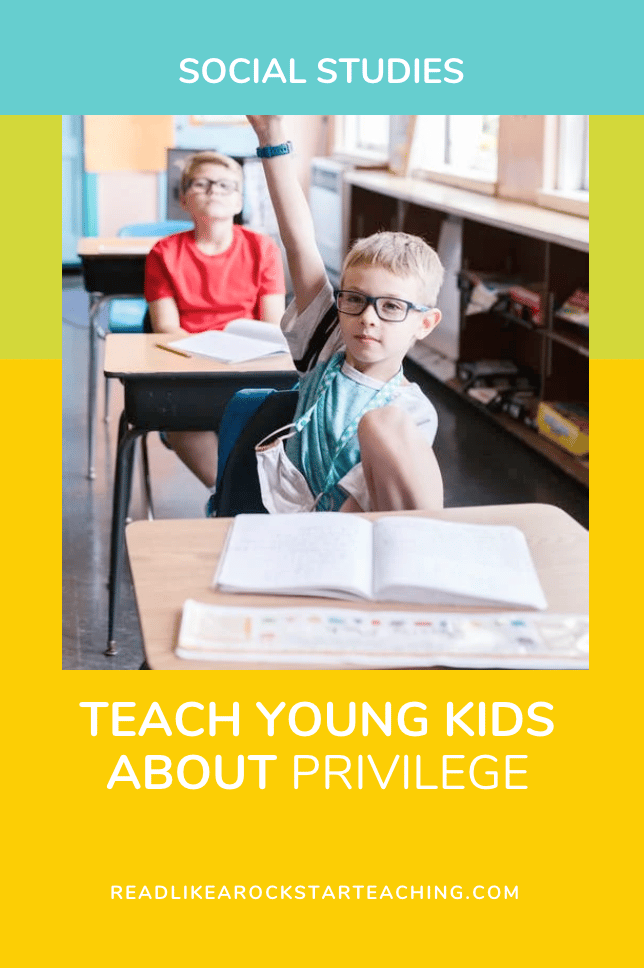
*Due to the sensitive nature of the following conversation, it is meant to be done at home with your own family, not at school.*
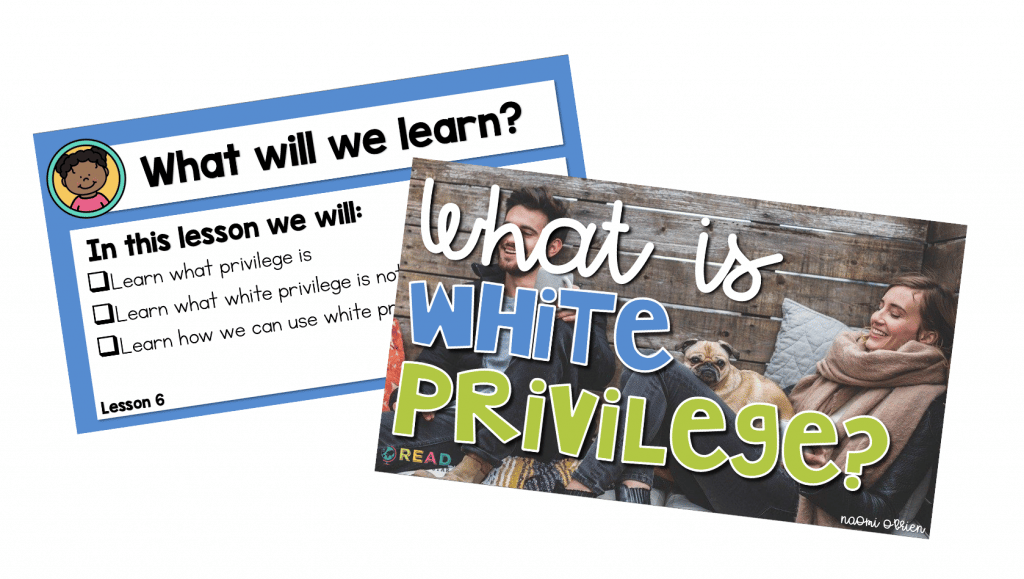
How do we teach young kids about privilege, let alone white privilege? And with K-1 children? It feels daunting and scary, but it is necessary. If you have spent any time around kids, you know they are obsessed with fairness and are justice oriented. Most people think that talking about privilege makes people feel bad. On the contrary, teaching kids about it should allow them to notice it and feel agency in speaking up when they have some extra power or advantage.
Having privilege does not deny a person’s struggles or hardships in life. It does not imply that a person has not worked hard. It means that [insert factors such as race, gender, sexuality, non-disabled etc] did not hold you back. It means a system is built with you in mind. It is an unearned invisible leg up that you may not have asked for, but you have it whether you want it or not.
My friend lived in Chicago and got around just fine taking the trains. She never noticed there are only stairs leading to all the trains, and very often there is no elevator. She shared that when she had to haul a grocery cart around, she noticed. That system was built for nondisabled people on two feet. There was no place for strollers, wheelchairs, or crutches. Does this mean it is not hard to haul groceries around? That she may also have a long commute to work and get tired? No. But she didn’t have the extra burden of needing an elevator. Only when she was inconvenienced did she notice.
Another friend is Indian. She was in 8th grade and reading a class book. The teacher expected the students to pull out and name the Christian themes in the story. When she was confused (because she is not Christian), he said, “You live in America, you need to know the Bible.” This is religious privilege. The educational system (and the book choice) was made for the general white Christian audience. Her classmates didn’t ask to be familiar with religious themes, but they were. She had an extra burden due to her religion.
When I go to hotels, the shampoo is made for a certain hair type. It doesn’t work on Black hair. I have to travel with extra things because the hotel system is made for white hair. The lotion is never moisturizing enough. Now, I don’t expect the hotel to cater to me, but there’s no denying that it does cater to others (yes, even though they didn’t ask).
When it comes to white privilege, this is yet another type of unearned advantage that those with it may have trouble seeing. (Does a fish notice water?) White privilege is built on racism and the history of this country (the United States of America). Certain groups cannot live where they want because the housing system is set up a certain way. Black farmers don’t get loans as easily because of the banking systems and biases that are built in. Yes, people sitting in these positions of power perpetuate it, but the system was also built for them. Policing is another place where we see the built in system over and over again. The system was formed out of a need for white people wanting to capture enslaved people running away to freedom. Is it a surprise that it transformed into the system that it is today?
Like any relationship, it is important to know the origins so we may move forward in healing and make things better for everyone.
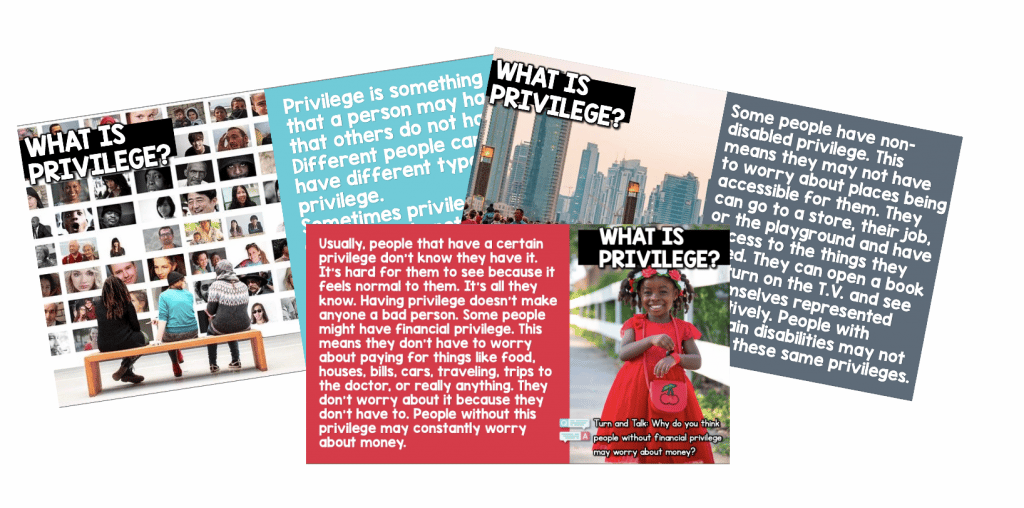
Why does it matter whether or not we teach young kids about privilege? We are all born with some kind of privilege. It depends on where you live and life circumstances. Due to how America was founded, white, nondisabled, rich, educated, heterosexual, Christian, men, tend to have the most privilege. If you are all of the above but a woman, you lack gender privilege but still have all the other privileges.
When we are in a group of privilege, it is often difficult to understand or see what others who are affected are talking about. Questions abound- What do you mean your school funding is different? What do you mean Black people aren’t allowed to live in this neighborhood? You must not have gotten the job because of qualifications. How can there not be healthy food in your area? I’ve never had a problem finding something in my size. Etc. Etc.
Young children are 100% able to understand this. We can even teach them how intersectionality works. Teaching them about privilege will help them work for a more equitable and just society. One where all kids get to be kids. One where everyone has access to healthy food. One where some kids are not thought to be more threatening than others. The younger we start, the more open minded children are.
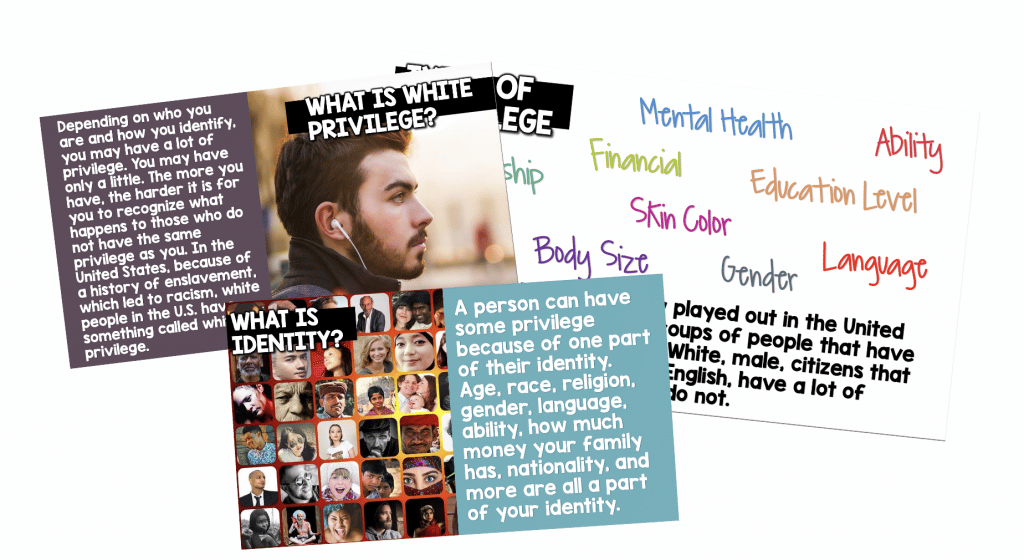
When I teach young my own kids about privilege, I find that they are open to understanding. My son is a biracial boy. While he may not have all the privileges, he does have some, and it is important for him to be aware of what those are. Unfortunately, it works out that people are more likely to listen to the person with privilege. A man speaking up for a woman is listened to more than the woman. A white person talking about racism may be more palatable to other white people than a person of color. In this way, it is good for kids to understand where they can speak up and be listened to.
My friend has talked with her son about having male straight privilege. He is 7. When a gender fluid child in his class declared in a game that he wanted to have the title of queen not king, some kids were confused. Her son said, “ok, he’s the queen,” and moved on. He knew that child was at risk for teasing, and he quickly and easily stepped in and got the group to move on.
Another way to practice is to role play with the book Chocolate Me. In the book there are some white kids being racist. If you were a white child in that group, how could you use your privilege to stop the racism? What could you say? It will be more likely that the kids will listen to you. This is a scenario I have addressed with kids before.
In my opinion, yes! I can think of so many examples from being in elementary school through adulthood, where something happened and I knew it was unfair, but I was confused about why it happened. A large part of that confusion could have been cleared up had I known white privilege was a thing.
I think about a time in high school when a white friend and I did a partnered assignment together for an English class. I actually did most of the work and we turned it in together. She got an A and I received a C+. How? We turned in the exact same thing. My friend thought it was weird, but didn’t recognize the privilege of the assumption she probably did most of the work. Luckily, my mom was very aware of what had transpired and that situation was taken care of quickly.
I remember being in a pet store with my cousin and asking if we could hold a hamster. We were in middle school. A sign said to ask for help if you wanted to hold one. We were told the store policy changed and we couldn’t. We were completely fine with this until a few minutes later when we saw two white children of similar ages with the same sales associate holding hamsters. When we asked about it, the sales associate just shrugged and didn’t help us, and the white children just looked confused.
Imagine if they were aware of their privilege and spoke up about this injustice. Imagine the wording we could have used if we had the vocabulary. We definitely knew it was discrimination, but we didn’t yet understand privilege.
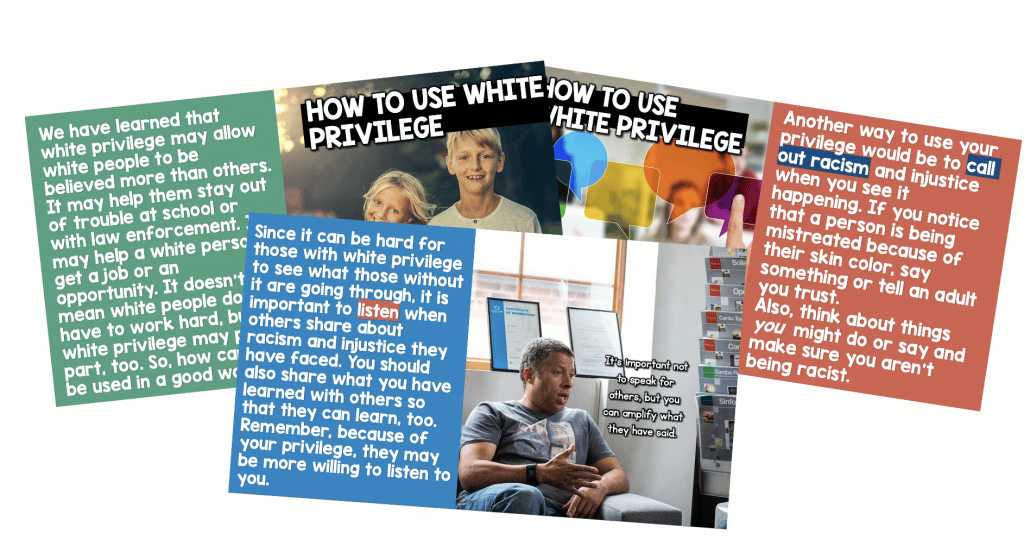
It is tempting to want to teach young kids about privilege in the classroom. However, due to the sensitive nature of this lesson/conversation, it is meant to be done individually at home. It would be very awkward for a white teacher to be delivering a privilege lesson with children of color in their class (or any other power dynamic.) The lesson includes notes for you, the caregiver, as well as worksheets for students to role play various types of privilege. Privilege comes in all forms- race, education, gender, sexuality, finances, immigration status, and more. While this lesson focuses on white privilege, you can include other intersections as kids become fluent in the language and concepts.
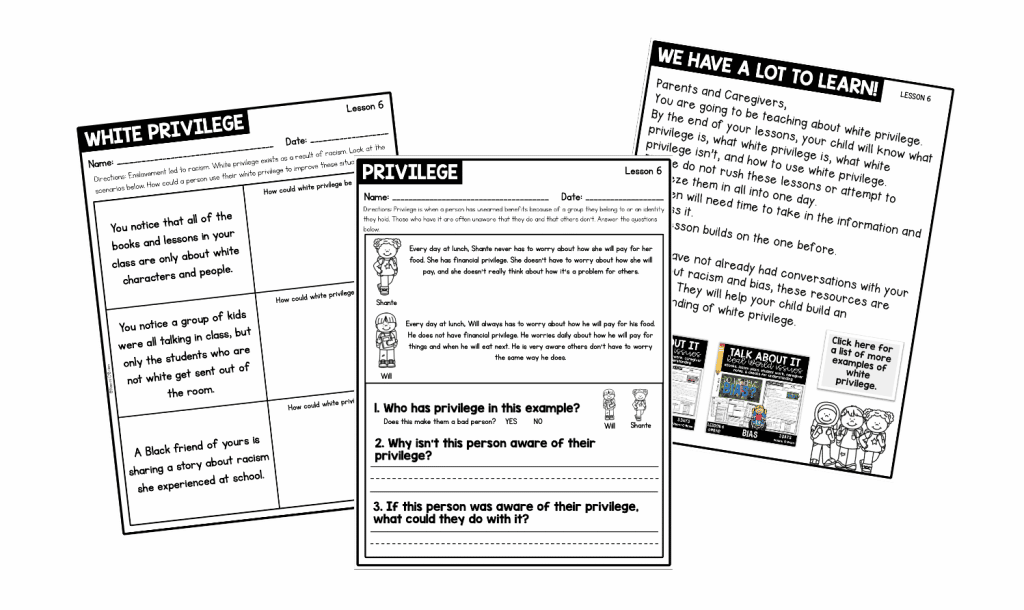
There are many picture books to help you teach young kids about privilege. As with all things, as an adult teaching child, make sure you are also learning beside them. An adult list is included as well.
Picture Books
Middle Grade:
Books for Adults
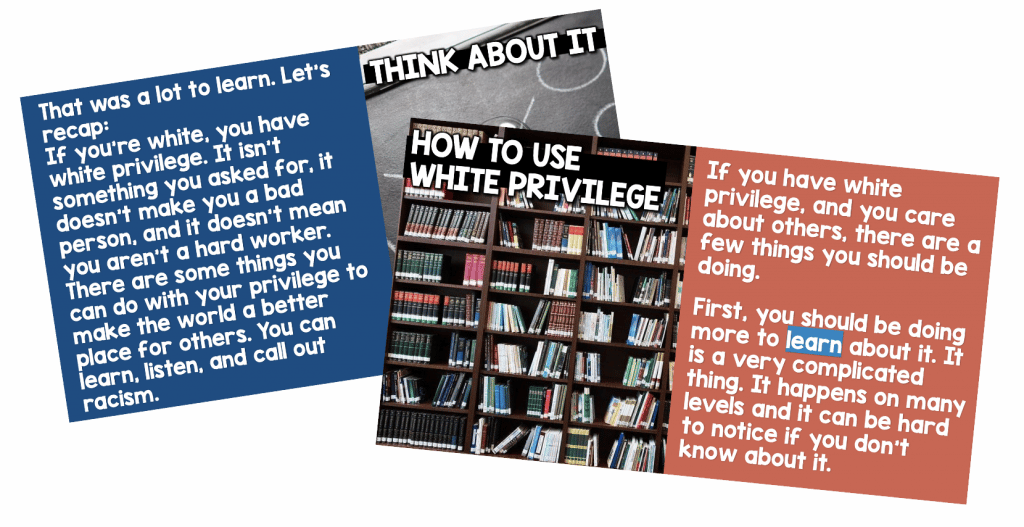
If you would like a ready made resource, I have you covered. check out the various picture books and Privilege lesson below.
Talk about disability rights and privilege with this picture book.
Talk about treating different cultures with respect.
Talk about the privilege of being housed.
Check out the rest of the building perspective through picture books line, where you can continue talking about privilege. Read about it here!
The resource shown in this blog post can be found by clicking here.
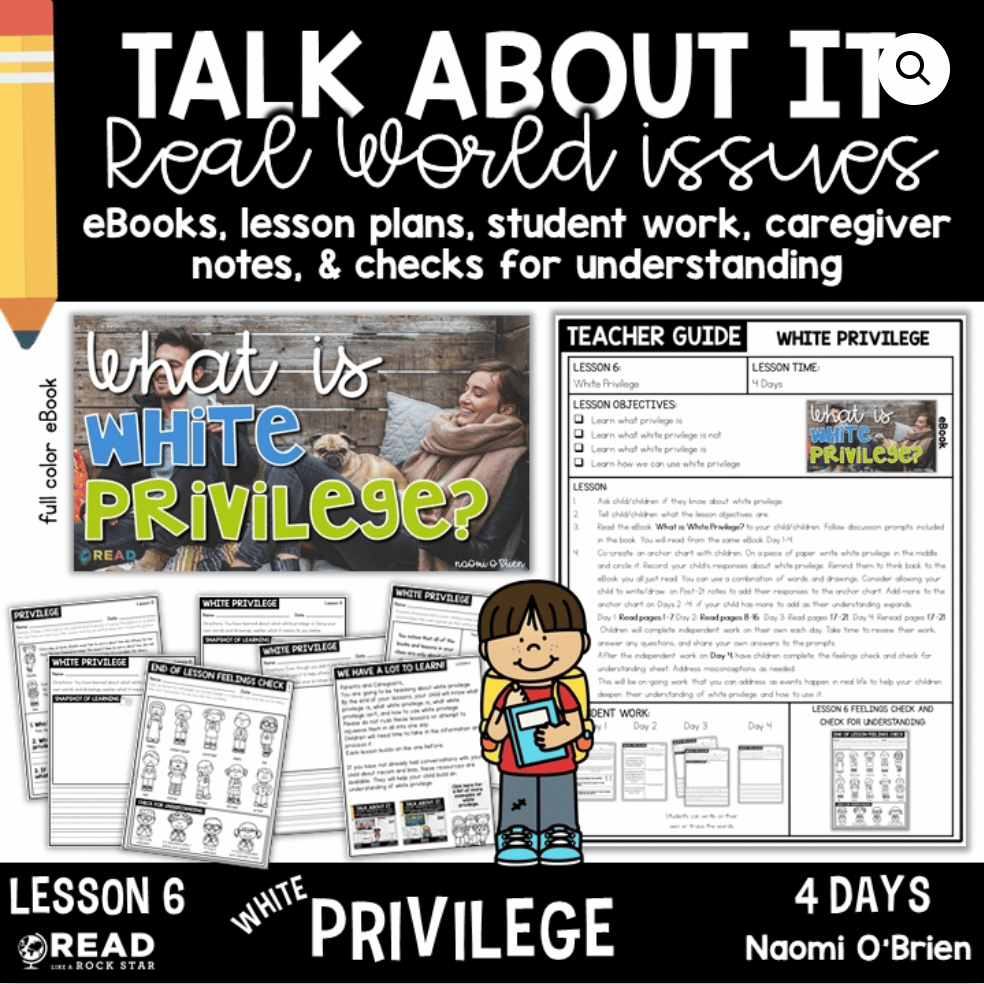

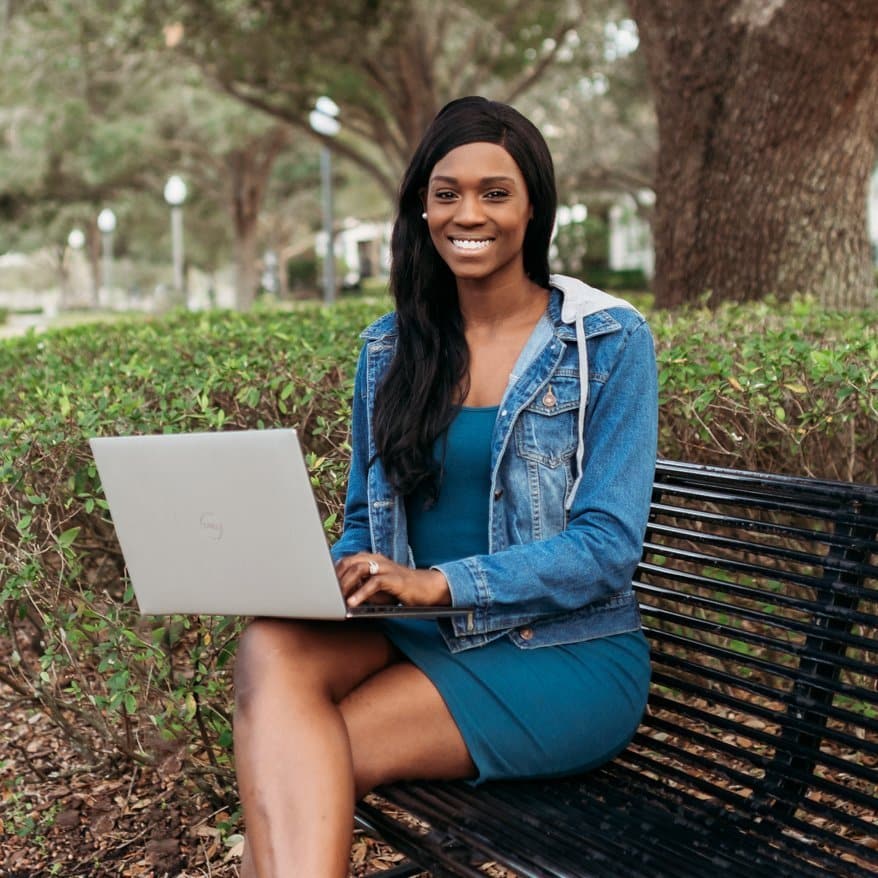
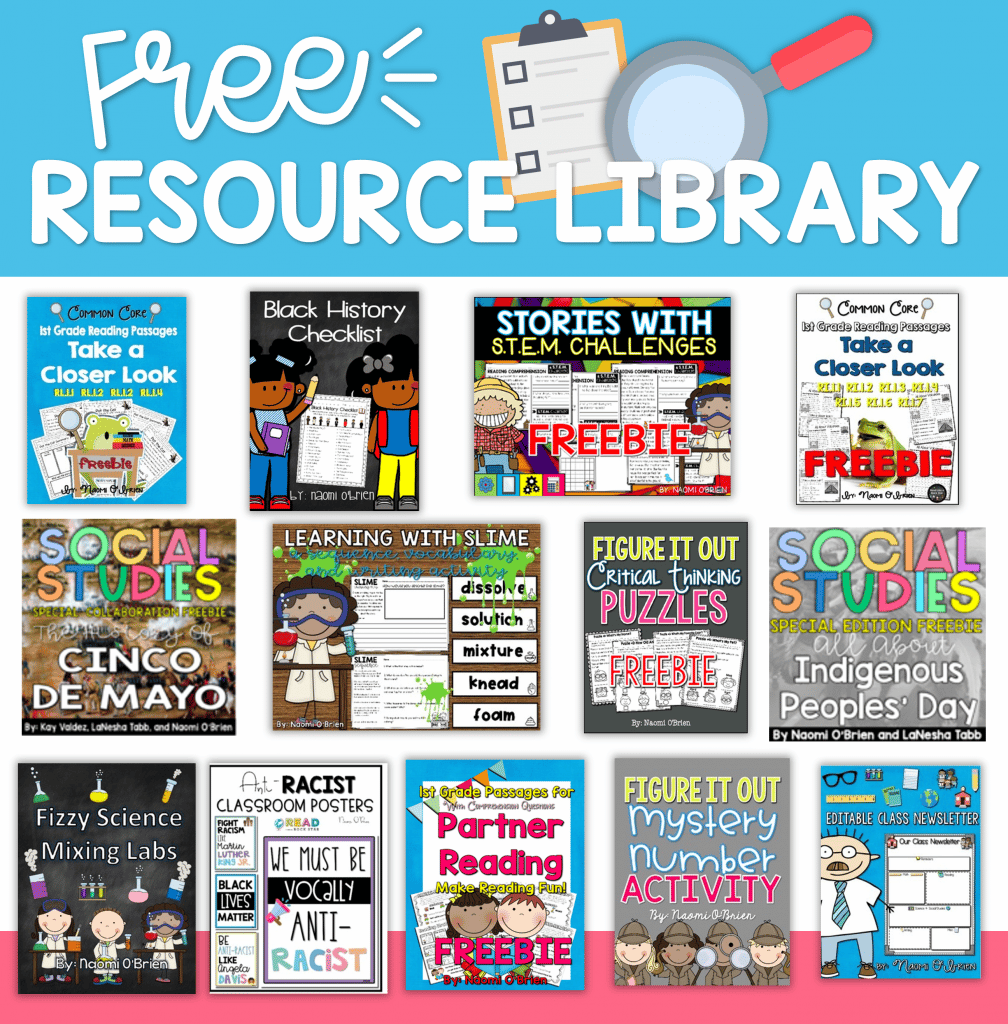
| Cookie | Duration | Description |
|---|---|---|
| cookielawinfo-checkbox-analytics | 11 months | This cookie is set by GDPR Cookie Consent plugin. The cookie is used to store the user consent for the cookies in the category "Analytics". |
| cookielawinfo-checkbox-functional | 11 months | The cookie is set by GDPR cookie consent to record the user consent for the cookies in the category "Functional". |
| cookielawinfo-checkbox-necessary | 11 months | This cookie is set by GDPR Cookie Consent plugin. The cookies is used to store the user consent for the cookies in the category "Necessary". |
| cookielawinfo-checkbox-others | 11 months | This cookie is set by GDPR Cookie Consent plugin. The cookie is used to store the user consent for the cookies in the category "Other. |
| cookielawinfo-checkbox-performance | 11 months | This cookie is set by GDPR Cookie Consent plugin. The cookie is used to store the user consent for the cookies in the category "Performance". |
| viewed_cookie_policy | 11 months | The cookie is set by the GDPR Cookie Consent plugin and is used to store whether or not user has consented to the use of cookies. It does not store any personal data. |
Thank you for your interest in booking a private professional development experience! Please fill out our Booking Inquiry form and a member of our team will contact you soon.